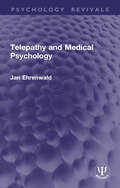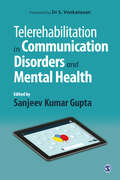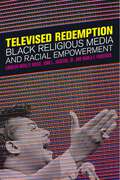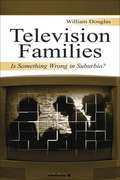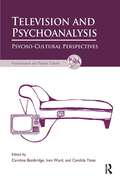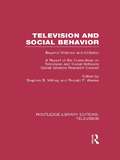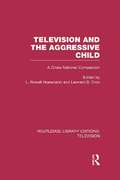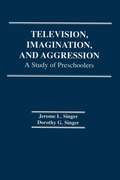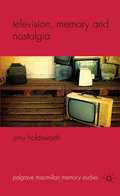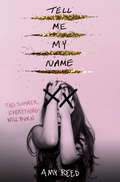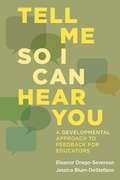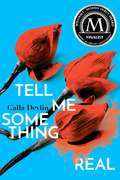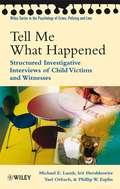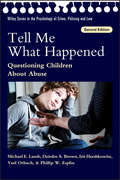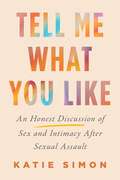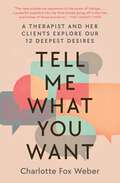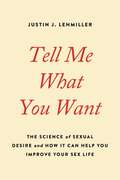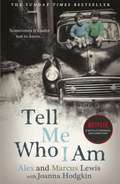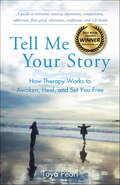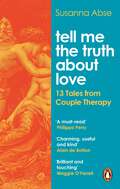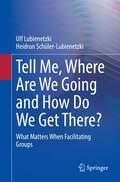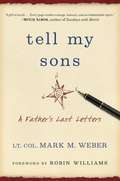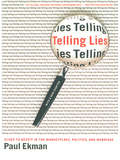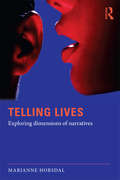- Table View
- List View
Telepathy and Medical Psychology (Psychology Revivals)
by Jan EhrenwaldFirst published in 1947, the original blurb for Telepathy and Medical Psychology reads: ‘An increasing mass of evidence compiled during the past years has made the occurrence of telepathy and related phenomena an established fact. However, contemporary medical psychology has refused so far to acknowledge their existence and to reconcile them with their systems of thought. Dr Ehrenwald’s book is the first serious attempt in this direction. He shows that telepathy is subject to much the same psychological laws as govern dreams, neurotic symptoms and certain manifestations of mental disease. His approach moves largely along the lines of the psychoanalyst, but his conclusions are likely to shake some of the basic propositions of psychoanalysis itself. At the same time they throw fresh light on certain aberrations of character and personality and his new interpretation of paranoia and related disorders may well mark a turning point in modern psychopathology and psychiatry.Dr Ehrenwald writes his book not only for the medical psychologist: the problems discussed called for the attention of a wider public and his way of presentation makes it fascinating reading for the educated layman.’ Today it can be read in its historical context.
Telerehabilitation in Communication Disorders and Mental Health
by Sanjeev Kumar GuptaThe increasing influence of digital media on all aspects of life, especially the use of Internet and smartphone, has not left even the field of healthcare practice untouched. Telerehabilitation, implying the use of telecommunications in rehabilitation activities, is being used widely in the treatment of communication and mental health disorders. The use of telerehabilitation services makes rehabilitation more feasible, fast, time-saving and cost-effective for people who face constraints in physically presenting themselves to healthcare providers due to extent of retardation, illness or commuting issues. It is thus a boon for the people who stay in remote areas and have no access to healthcare professionals in close vicinity. Therefore, research is underway on the optimal means to deliver telerehabilitation services both locally and globally and is now seen as a critical activity in healthcare.
Televised Redemption: Black Religious Media and Racial Empowerment
by Carolyn Moxley Rouse John L. Jackson Jr. Marla F. FrederickHow Black Christians, Muslims, and Jews have used media to prove their equality, not only in the eyes of God but in society. The institutional structures of white supremacy—slavery, Jim Crow laws, convict leasing, and mass incarceration—require a commonsense belief that black people lack the moral and intellectual capacities of white people. It is through this lens of belief that racial exclusions have been justified and reproduced in the United States. Televised Redemption argues that African American religious media has long played a key role in humanizing the race by unabashedly claiming that blacks are endowed by God with the same gifts of goodness and reason as whites—if not more, thereby legitimizing black Americans’ rights to citizenship. If racism is a form of perception, then religious media has not only altered how others perceive blacks, but has also altered how blacks perceive themselves. Televised Redemption argues that black religious media has provided black Americans with new conceptual and practical tools for how to be in the world, and changed how black people are made intelligible and recognizable as moral citizens. In order to make these claims to black racial equality, this media has encouraged dispositional changes in adherents that were at times empowering and at other times repressive. From Christian televangelism to Muslim periodicals to Hebrew Israelite radio, Televised Redemption explores the complicated but critical redemptive history of African American religious media.
Television Families: Is Something Wrong in Suburbia? (Routledge Communication Series)
by William DouglasThis volume examines the analysis that was designed to map the development of the television family and assess its current state and, at the same time, to provide insight into the tangled relationships between fictional and real family life. In order to do this, the investigation examines the evolution of the American family, paying special attention to the postwar family, which is not only used recurrently as a benchmark for assessing the performance of modern families but also constituted television's first generation of families. The investigation also traces the evolution of the popular family in vaudeville, comics, and radio. However, the primary focus of the examination is the development of the television family, from families, such as the Nelsons, Andersons, and Cleavers, to more contemporary families, such as the Huxtables, Conners, and Taylors. The unit of analysis for the investigation is the relationship rather than the individual. Hence, the book deals with the portrayal of spousal, parent-child, and sibling relationships and how those portrayals differ across time and across groups defined by ethnicity, gender, and age. Moreover, the relational analysis is expansive so that television family relationships are examined in regard to power and affect, performance, and satisfaction and stability. Television Families provides a thorough summary and critical review of extant research, designed to promote informed classroom discussion. At the same time, it advances a number of hypotheses and recommendations and, as such, is intended to influence subsequent theory and research in the area. The book is intended for senior undergraduate students, graduate students, and television and family researchers.
Television and Psychoanalysis: Psycho-Cultural Perspectives (The\psychoanalysis And Popular Culture Ser.)
by Ivan Ward Caroline Bainbridge Candida YatesDespite the prominence of television in our everyday lives, psychoanalytic approaches to its significance and function are notoriously few and far between. This volume takes up perspectives from object relations theory and other psychoanalytic approaches to ask questions about the role of television as an object of the internal worlds of its viewers, and also addresses itself to a range of specific television programmes, ranging from Play School, through the plays of Jack Rosenthal to recent TV blockbuster series such as In Treatment. In addition, it considers the potential of television to open up new public spaces of therapeutic experience. Interviews with a TV producer and with the subject of a documentary expressly suggest that there is scope for television to make a positive therapeutic intervention in people's lives. At the same time, however, the pitfalls of reality programming are explored with reference to the politics of entertainment and the televisual values that heighten the drama of representation rather than emphasising the emotional experience of reality television participants and viewers.
Television and Social Behavior: Beyond Violence and Children / A Report of the Committee on Television and Social Behavior, Social Science Research Council (Routledge Library Editions: Television)
by Stephen B. Withey and Ronald P. AbelesThis book, published originally in 1980, addressed the needs for a profile of televised violence which considered the advantages and disadvantages of various measures and for a furthering of research directions beyond the then-popular emphasis on children. The Committee on Television and Social Behavior was formed in1972 and stimulated new research in order to provide a multidimensional profile of the social effects of television programming. Chapters here look at the effect of television on adults as well as children, particularly special audiences such as the elderly and minority groups. An excellent summary of the various conceptual, substantive and methodological issues around television’s influence.
Television and the Aggressive Child: A Cross-national Comparison (Routledge Library Editions: Television)
by L. Rowell Huesmann and Leonard D. EronThe research presented in this book, originally published in 1986, looks to pinpoint the psychological processes involved in the media violence-aggression relation. Expanding on earlier studies, the compilation of essays here delves deeply into aggression study and compares results about media influence across 5 countries. Cultural norms and programming differences are investigated as well as age and gender and other factors. What is offered overall is a psychological model in which TV violence is both a precursor and a consequence of aggression.
Television, Imagination, and Aggression: A Study of Preschoolers
by D. G. SingerFirst Published in 1981. Routledge is an imprint of Taylor & Francis, an informa company.
Television, Memory and Nostalgia
by Amy HoldsworthAn innovative and original new study, Television, Memory and Nostalgia re-imagines the relationship between the medium and its forms of memory and remembrance through a series of case studies of British and North American programmes and practices. These include ER , Grey's Anatomy , The Wire , Who Do You Think You Are? , and Life on Mars .
Tell Me My Name
by Amy ReedWe Were Liars meets Speak in this haunting, mesmerizing psychological thriller—a gender-flipped YA Great Gatsby—that will linger long after the final lineOn wealthy Commodore Island, Fern is watching and waiting—for summer, for college, for her childhood best friend to decide he loves her. Then Ivy Avila lands on the island like a falling star. When Ivy shines on her, Fern feels seen. When they're together, Fern has purpose. She glimpses the secrets Ivy hides behind her fame, her fortune, the lavish parties she throws at her great glass house, and understands that Ivy hurts in ways Fern can't fathom. And soon, it's clear Ivy wants someone Fern can help her get. But as the two pull closer, Fern's cozy life on Commodore unravels: drought descends, fires burn, and a reckless night spins out of control. Everything Fern thought she understood—about her home, herself, the boy she loved, about Ivy Avila—twists and bends into something new. And Fern won't emerge the same person she was.An enthralling, mind-altering psychological thriller, Tell Me My Name is about the cost of being a girl in a world that takes so much, and the enormity of what is regained when we take it back.The New York Times: "13 Y.A. Books to Add to Your Reading List This Spring""A lush, gorgeously crafted page-turner." —Jennifer Mathieu, author of Moxie&“A kaleidoscope of light and shadow that will keep you flipping page after page.&” —Amber Smith, author of The Way We Used to Be ★ "Immersive [and] smartly written.&” —SLJ (starred review)&“Only Amy Reed could write a novel this dark, this gorgeous, this forward-looking while speaking to our present moment.&” —Wiley Cash, author of A Land More Kind Than Home"The best kind of literary thriller—one with as much conscience as pulse." —Brendan Kiely, co-author of All American Boys&“I haven&’t felt this way since reading We Were Liars—mind blown.&” —Jaye Robin Brown, author of Georgia Peaches and Other Forbidden Fruit★ "As much Hitchcockian suspense as Fitzgerald&’s tarnished glitz." —BCCB (starred review)"This novel is amazing . . . A pulsating, hypnotic retelling.&” —Lilliam Rivera, author of The Education of Margot Sanchez&“Relentlessly compelling . . . Reed's latest is a literary thrill ride.&” —Kelly Jensen, author of (Don&’t) Call Me Crazy and editor at BookRiot&“[A] harrowing tale of personal trauma in a violently polarized society.&” —Kirkus&“A compelling and propulsive thriller.&” —Jeff Zentner, author of The Serpent King"I barely breathed the last 100 pages. Simply stunning.&” —Megan Shepherd, author of The Madman's Daughter
Tell Me So I Can Hear You: A Developmental Approach to Feedback for Educators
by Eleanor Drago-Severson Jessica Blum-DeStefanoIn Tell Me So I Can Hear You, Eleanor Drago-Severson and Jessica Blum-DeStefano show how education leaders can learn to deliver feedback in a way that strengthens relationships as well as performance and builds the capacity for growth. Drawing on constructive-developmental theory, the authors describe four stages of adult growth and development and explain how to differentiate feedback for colleagues with different &“ways of knowing,&” which include: • Instrumental knowers, who tend to see things in black and white (&“Did I do it right or wrong?&”) and may need to develop the capacity for reflection. • Socializing knowers, who are concerned with maintaining relationships (&“What do you want me to do?&”) and may need support developing their own ideas. • Self-authoring knowers, who have strong ideologies and values (&“How does this fit with my goals and vision?&”) and may need help with perspective taking. • Self-transformative knowers, who are able to examine issues from multiple points of view (&“How can I understand this more deeply?&”) and may need guidance in resolving tensions and contradictions. The authors show how leaders can provide feedback in ways that &“meet people where they are&” while expanding the developmental capacities educators bring to their work. Drago-Severson and Blum-DeStefano provide real-life examples with practical strategies for creating a safe space for feedback, finding the right words, and bridging feedback and action. Tell Me So I Can Hear You offers invaluable guidance to help educators support a culture of learning in classrooms, schools, and districts.
Tell Me Something Real
by Calla Devlin<p>Three sisters struggle with the bonds that hold their family together as they face a darkness settling over their lives in this masterfully written debut novel. <p>There are three beautiful blond Babcock sisters: gorgeous and foul-mouthed Adrienne, observant and shy Vanessa, and the youngest and best-loved, Marie. Their mother is ill with leukemia and the girls spend a lot of time with her at a Mexican clinic across the border from their San Diego home so she can receive alternative treatments. <p>Vanessa is the middle child, a talented pianist who is trying to hold her family together despite the painful loss that they all know is inevitable. As she and her sisters navigate first loves and college dreams, they are completely unaware that an illness far more insidious than cancer poisons their home. Their world is about to shatter under the weight of an incomprehensible betrayal...</p>
Tell Me What Happened
by Michael E. Lamb Irit Hershkowitz Yael Orbach Phillip W. EsplinInvestigation of child abuse is often hampered by doubts about the reliability of children as only sources of information. Over the last decade, consensus has been reached about children's limitations and competencies. New for the Wiley Series in the Psychology of Crime, Policing and Law, Tell Me What Happened summarizes key research on children's memory, communicative skills and social tendencies, describes how it can be incorporated into a specific structured interview technique and reviews evidence involving more than 40,000 alleged victims.
Tell Me What Happened: Questioning Children About Abuse (Wiley Series in Psychology of Crime, Policing and Law #58)
by Michael E. Lamb Irit Hershkowitz Yael Orbach Phillip W. Esplin Deirdre A. BrownRepresents a scholarly and ambitious attempt to improve the quality of interviews received by the courts and minimize the risks of miscarriages of justice, for victims and defendants This book updates the previous review of research on children’s testimony—reexamining and readdressing how the quality of information provided by young witnesses is affected by the way they are questioned. Drawing upon both experimental and field studies conducted in different countries, it summarizes evidence supporting the effectiveness of the National Institute for Child Health and Human Development (NICHD) Protocol and showcases the Protocol’s superiority over other current interviewing techniques for eliciting detailed and forensically useful content from child complainants. Written with both child protection professionals and researchers in mind, Tell Me What Happened: Structured Investigative Interviews of Child Victims and Witnesses offers advice and opinions drawn from actual investigative interviews as well as academic research. Its insightful chapters cover: children’s testimony; interview and questioning strategies; how investigators typically interview alleged victims; the NICHD Investigative Interview Protocols; the impact that following the Protocol has on interviews and children’s responses; interviewing victims under the age of six; interviewing children with developmental disabilities; using tools and props to complement the Protocol; training and maintaining good interviewing practices; and more. Provides a primary source of guidance practitioners and professionals involved in child protection Updates guidance for interviewers by adding consideration of emotional and motivational factors to better understand children’s behavior during interviews Integrates the substantial body of research published over the last decade and reflects upon questions that the field should continue to address Tell Me What Happened: Structured Investigative Interviews of Child Victims and Witnesses deserves to be read by all practitioners involved in child protection, whether as investigators, interviewers, judges, or lawyers.
Tell Me What You Like: An Honest Discussion of Sex and Intimacy After Sexual Assault
by Katie SimonHopeful, groundbreaking, and anchored in true stories, this much-needed book from sexuality journalist and fellow sexual assault survivor Katie Simon delves into the challenges of moving from trauma to healing. Tell Me What You Like will guide sexual assault survivors toward the sex and relationships they want, and speaks to the shift in sexual culture we all need. Over a decade ago, Katie Simon began seeking out stories of people who faced sexual challenges after sexual trauma—just as she did. Simon interviewed dozens of survivors, and her investigation yielded diverse responses from people of all backgrounds, ultimately confirming that there is no single path toward healing. Simon&’s research led her to life-changing findings that sexual assault survivors most want to know about, including coping with trauma triggers and traumatic stress symptoms such as anxiety, depression, physical pain, and flashbacks. From embodied consent to self-pleasure, sexual regret, breakups, and beyond, you&’ll find answers to all your questions about how sexual trauma affects sex and relationships within these pages, in stories told by survivors who&’ve actually been there. Millions of survivors across the United States are treated as irreparably broken. Simon offers a positive approach to healing based on empathy and community—and the understanding and tools to navigate trauma and cultivate the sex lives we desire and deserve. The narratives Simon has gathered break down the potential obstacles to rebuilding post-assault, and offer multiple paths forward with optimistic, new approaches to sex after sexual assault. Packed with insights, stories, and advice, this invaluable guide reimagines what sex can look like—not only for survivors, but for all of us.
Tell Me What You Want: A Therapist and Her Clients Explore Our 12 Deepest Desires
by Charlotte Fox WeberFor fans of Maybe You Should Talk to Someone and Tiny Beautiful Things, this inspiring and moving exploration of the twelve fundamental psychological needs we all share goes behind the closed doors of therapy to guide us in navigating our deepest longings.What do we want? And how do we get it? Chloe is beautiful and fiercely bright, but she feels desperately deprived. Elliot, lost and adrift, is secretly grieving the loss of his famous lover. Rosie has always tried to follow the rules of cultural expectations, but a year into her marriage, she still hasn&’t had sex with her husband. Dwight is determined to be upbeat, even in the face of his wife&’s betrayal. Each of us, at certain moments in our lives, can feel lost or confused. We often don&’t know how to get what we want, or what we think we want, but we share these universal desires: to love and be loved; understanding, power, attention, freedom; to create, to belong, to win, to connect, to control; and we want what we shouldn&’t. In each of these twelve chapters, focused on one of these universal desires, psychotherapist Charlotte Fox Weber takes you behind the closed doors of a therapy session to bear witness as she guides a client towards profound insights, change, and growth. Written with warmth and compassion, full of dramatic, intimate, and moving personal stories, and based on careful research as well as firsthand observations, Tell Me What You Want is an inspirational guide to living well.
Tell Me What You Want: The Science of Sexual Desire and How It Can Help You Improve Your Sex Life
by Justin J. LehmillerA leading expert on human sexuality and author of the blog Sex and Psychology offers an unprecedented look at sexual fantasy based on the most comprehensive, scientific survey ever undertaken. What do Americans really want when it comes to sex? And is it possible for us to get what we want? Justin J. Lehmiller, one of the country's leading experts on human sexuality and author of the popular blog Sex and Psychology, has made it his career's ambition to answer these questions. He recently concluded the largest and most comprehensive scientific survey of Americans' sexual fantasies ever undertaken, a monumental two-year study involving more than 4,000 Americans from all walks of life, answering questions of unusual scope. Based on this study, Tell Me What You Want offers an unprecedented look into our fantasy worlds and what they reveal about us. It helps readers to better understand their own sexual desires and how to attain them within their relationships, but also to appreciate why the desires of their partners may be so incredibly different. If we only better understood the incredible diversity of human sexual desire and why this diversity exists in the first place, we would experience less distress, anxiety, and shame about our own sexual fantasies and better understand why our partners often have sexual proclivities that are so different from our own. Ultimately, this book will help readers to enhance their sex lives and to maintain more satisfying relationships and marriages in the future by breaking down barriers to discussing sexual fantasies and allowing them to become a part of readers' sexual realities.
Tell Me Who I Am: The Story Behind the Netflix Documentary
by Joanna Hodgkin Alex And Marcus LewisThe story behind the hit Netflix documentary: The bestselling account of the bond between brothers and the shocking legacy of a dangerous mother.Imagine waking up one day to discover that you have forgotten everything about your life. Your only link with the past, your only hope for the future, is your identical twin.Now imagine, years later, discovering that your twin had not told you the whole truth about your childhood, your family, and the forces that had shaped you. Why the secrets? Why the silences? You have no choice but to begin again.This has been Alex's reality: a world where memories are just the stories people tell you, where fact and fiction are impossible to distinguish. With dogged courage he has spent years hunting for the truth about his hidden past and his remarkable family. His quest to understand his true identity has revealed shocking betrayals and a secret tragedy, extraordinary triumph over crippling adversity and, above all, redemption founded on brotherly love.Marcus his twin brother has sometimes been a reluctant companion on this journey, but for him too it has led to staggering revelations and ultimately the shedding of impossible burdens. Their story spans continents and eras, from 1950s debutantes and high society in the Home Counties to a remote island in the Pacific and 90s raves. Disturbing, funny, heart-breaking and affirming, Alex and Marcus's determination to rebuild their lives makes us look afresh at how we choose to tell our stories.
Tell Me Your Story: How Therapy Works to Awaken, Heal, and Set You Free
by Tuya PearlWinner of the Best Book Award for Psychology and Mental Health and Finalist for Best New Non-Fiction Book of the Year by Best Book Awards Winner of the International Book Award for Self Help and Relationships Foreword INDIES Book of the Year Awards Finalist If you’re feeling stuck, overwhelmed by personal challenges, need more joy and serenity, or simply wonder what happens in therapy, step inside Tuya Pearl’s office to experience the transformational process. With keys and a professional therapist to guide you, you’ll unlock your story with clarity that will astound, heal, and set you free. Participate in sessions that get to the source of anxiety, depression, compulsions, self-doubt, and other emotional issues—listening to others’ real-life stories and telling your own—with prompts to inspire and awaken you. From the privacy of a confidential read, and with the perspective of both client and healer, Tell Me Your Story moves you through the stages of therapy—from the initial phone call to the final goodbye—connecting body, mind, and spirit with inner wisdom to reclaim and enjoy your most authentic life.
Tell Me the Truth About Love: 13 Tales from Couple Therapy
by Susanna Abse'Brilliant and touching' Maggie O'Farrell'A must-read for everyone wanting to understand more about what makes us fall in - and out - of love' Philippa Perry'A charming, useful, kind book about the pains and hopes of relationships' Alain de BottonDrawing on over 30 years of therapeutic encounters with people facing hurdles in their love lives, former Chair of the British Psychoanalytic Council Susanna Abse takes us deep inside one of the most fascinating realms there is: other people's relationships.Candid and captivating, each chapter is inspired by a classic, timeless story. Parents blow their straw house down; Rapunzel yearns for companionship but remains trapped in her castle. Couples strive to navigate the fall from Eden, the bitter taste of the poison apple and strangers in their beds.From dealing with infidelity to navigating our changing role within a single relationship over the course of a lifetime, Tell Me the Truth About Love sheds vivid light on the human heart, and its struggle to both embrace life's greatest gift and protect itself from pain. Inside, you will find solace, wisdom and unparalleled insight into how, and why, we love.
Tell Me, Where Are We Going and How Do We Get There?: What Matters When Facilitating Groups
by Heidrun Schüler-Lubienetzki Ulf LubienetzkiLearn the basics and techniques of a special form of conversation in this descriptive textbook: facilitation. Find out how facilitation supports communication and cooperation in groups and unleashes the potential existing in the group. This book is a translation of the original German 1st edition Sag mal: Wo geht’s lang und wie kommen wir dahin? by Ulf Lubienetzki & Heidrun Schüler-Lubienetzki, published by Springer-Verlag GmbH Germany, part of Springer Nature in 2020. The translation was done with the help of artificial intelligence (machine translation by the service DeepL.com). A subsequent human revision was done primarily in terms of content, so that the book will read stylistically differently from a conventional translation. Springer Nature works continuously to further the development of tools for the production of books and on the related technologies to support the authors.
Tell My Sons: A Father's Last Letters
by Mark Weber Robin Robin WilliamsAt the pinnacle of a soaring career in the U. S. Army, Lt. Col. Mark M. Weber was tapped to serve in a high-profile job within the Afghan Parliament as a military advisor. Weeks later, a routine physical revealed stage IV intestinal cancer in the thirty-eight-year-old father of three. Over the next two years he would fight a desperate battle he wasn't trained for, with his wife and boys as his reluctant but willing fighting force. When Weber realized that he was not going to survive this final tour of combat, he began to write a letter to his boys, so that as they grew up without him, they would know what his life-and-death story had taught him--about courage and fear, challenge and comfort, words and actions, pride and humility, seriousness and humor, and viewing life as a never-ending search for new ideas and inspiration. This book is that letter. And it's not just for his sons. It's for everyone who can use the best advice a dying hero has to offer. Weber's stories illustrate that in the end you become what you are through the causes to which you attach yourself--and that you've made your own along the way. Through his example, he teaches how to live an ordinary life in an extraordinary way.
Tell Them What You Want
by Laverne Merritt-GordonTell Them What You Want is an inspirational coming-of-age story of an African-American girl (Bernie) growing up amidst the immense local and national social turmoil of the 1950s to mid 1980s. <p><p>Her journey begins in an abusive stepfather’s ‘devil house’ and ends in personal and professional triumphs that seemed destined to be out of reach. Sent as a ‘State kid’ to a South-west Ohio college town, Bernie confronts both personal and institutional obstacles with youthful naivety and determination. A teenage mother intent on protecting self and son, Bernie encounters many interesting and provocative people, some who put financial, educational, physical, and social obstacles in her way. Others mentor her through the racism, sexism, and politics of the time. <p><p>A combination of drama and humor, Tell Them What You Want is a story of losing and finding family, of relationships good and bad, acts of heroism large and small, and finally of an adult woman’s commitment to a future of protecting the little girl inside her who simply won’t let go.
Telling Lies (Revised Edition): Clues To Deceit In The Marketplace, Politics, And Marriage
by Paul EkmanFrom breaking the law to breaking a promise, how do people lie and how can they be caught? In this revised edition, Paul Ekman, a renowned expert in emotions research and nonverbal communication, adds a new chapter to present his latest research on his groundbreaking inquiry into lying and the methods for uncovering lies. Ekman has figured out the most important behavioral clues to deceit; he has developed a one-hour self-instructional program that trains people to observe and understand "micro expressions"; and he has done research that identifies the facial expressions that show whether someone is likely to become violent. ?Telling Lies?describes how lies vary in form and how they can differ from other types of misinformation that can reveal untruths. It discusses how a person's body language, voice, and facial expressions can give away a lie but still fool professional lie hunters--even judges, police officers, drug enforcement agents, and Secret Service agents.
Telling Lives: Exploring dimensions of narratives
by Marianne HorsdalBoth interest in and understanding of narrative analysis had developed rapidly in recent years and is now a mainstream element of research across many disciplines. In the groundbreaking Telling Lives: Exploring dimensions of narratives, the author illustrates as many facets as possible of the stories people tell about their lives. She demonstrates
